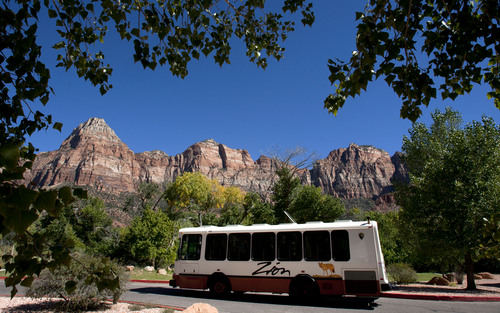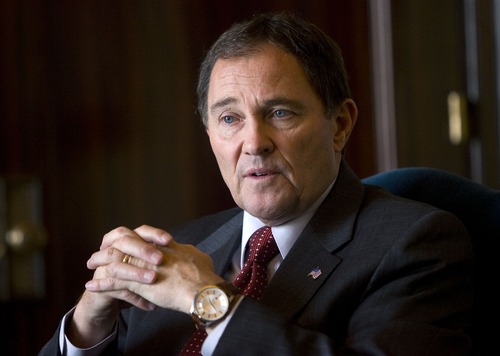This is an archived article that was published on sltrib.com in 2013, and information in the article may be outdated. It is provided only for personal research purposes and may not be reprinted.
Several Utah counties are laying the groundwork to invoke a new state law that they say could force the idled National Park Service to either reopen some of its Utah units or let the counties operate parts of Arches, Zion, Canyonlands and other national park destinations.
However, local leaders are seeking assurances from Gov. Gary Herbert that the state would indemnify them before they make any move to unlock the gates and take over the parks.
Thanks to the government shutdown, the nation's entire park system has been shuttered since Oct. 1. But the closures come at the heart of southern Utah's fall tourist season, spelling economic disaster for tourism-dependent communities.
Department of Interior officials Wednesday did not comment on Utah's plans.
The governor has spoken with Interior Secretary Sally Jewell, pleading with her to let the state help reopen the parks as soon as possible.
"If money is necessary to keep these parks open, we will lend them the money," Herbert told reporters Wednesday. "We can't wait three weeks. The damage is being done now. I want this resolved today. ...We will pay their salary. We'll augment it with local people — whether it's local police or volunteers."
Herbert agreed with local leaders in southern Utah that the park closures constitute a crisis and the park service actions seem unreasonable. For example, he said, it makes no sense for Zion rangers to prevent motorists from pulling off State Road 9 to take photos, but he emphasized he will not support county actions that would violate the law.
Several county commissions this week have passed declarations of emergency arising from the closures. The Grand County Council unanimously passed such a proclamation Tuesday. The San Juan County Commission had previously declared the emergency and passed a resolution Wednesday for county employees and resources to be made available "should the County Commission determine at sometime in the future to open federally closed national parks, national monuments and national recreation areas within San Juan County."
Moab usually is hopping in mid-October as tourists flock to the redrock getaway during a time of year that avoids the summer heat and crowds. Arches National Park logs 90,000 visits in a typical October, according to the proclamation.
Thousands more come to Grand County to access Canyonlands' eastern and northern districts, camp in Bureau of Land Management campgrounds and float federally managed stretches of the Green and Colorado rivers — activities that are off-limits during the federal shutdown.
"Grand County estimates over $2.6 million in lost revenue to date since Oct. 1 in commercial business alone," the council's proclamation states.
Council Chairman Gene Ciarus did not return phone messages Wednesday.
These county emergency declarations appear to be a first step toward invoking HB164, a law enacted this past legislative session to provide local officials greater control over federal lands within their counties. It was framed as a way to make the U.S. Forest Service more responsive to local concerns about tinderbox conditions in Utah's beetle-ravaged forests.
Sponsored by Rep. Marc Roberts, R-Santaquin, the bill enables county officials to exercise limited control over federal land if government management poses "an imminent threat to the health, safety or welfare of the people" in the county. If officials deem such a threat exists, the law calls on the sheriff to give written notice to the federal agency responsible, explaining the threat and detailing how and when the county wants it fixed.
If the agency doesn't respond within the specified time frame, officials "may take action to mitigate the risk."
To explore how to put HB164 to work in the parks crisis, Washington County Commissioner Alan Gardner hosted a teleconference Monday with several southern Utah and northern Arizona county commissioners and sheriffs, Attorney General John Swallow and the governor's deputy chief of staff, Mike Mower, and Rep. Ken Ivory, R-West Jordan, the outspoken lawmaker most engaged in orchestrating a state takeover of federal lands.
"The fact is that we've been put, and particularly our county leaders have been put, in a very untenable position of having to figure out how to struggle against their own government to protect the lives and fortunes and property and liberties of their people," Ivory said Wednesday. "You've got businesses, they're already struggling, the whole great recovery is a myth. So now you're going to see waves of bankruptcies likely in southern Utah. There was no contingency plan for this type of unnatural disaster."
Ivory said it is largely up to the governor to determine the next course of action.
Herbert has indicated he prefers that the feds operate the parks with state-supplied resources and his administration is negotiating with Department of the Interior to let that happen.
"There are places that can be opened up with minimal inconveniences to the federal government," Herbert said. "We are looking for solutions. I don't like people saying we can't do it. Let's find ways where we can do it."
Gardner said officials from nine Utah counties — including Grand, San Juan, Sevier, Piaute and others —met Wednesday afternoon to discuss strategies for taking over the parks. Gardner declined to speak about the specifics of those strategies, but said they could include partially reopening the parks using county employees as staff.
According to Gardner, the reopened parks would provide access to major sites and hiking trails but would probably not allow camping or backcountry access. Funding for the reopening would come from county budgets and sheriff's deputies would provide law enforcement inside the parks. Other county personnel, such as volunteers and county search and rescue, also would likely be deployed.
Gardner said the counties do not have the resources to run the parks long-term, but they could manage them over the short term. He also hopes the parks reopen later this week, though he did not know if that would ultimately happen.
County control could also mean some sort of clash between local and federal law enforcement. Gardner said there will not be armed confrontations, but federal personnel "have made it plain that law enforcement could be subject to charges" if they enter the parks. According to Gardner, that means county sheriff's deputies could end up facing trespassing charges for going into the parks.
The Utah Legislature repealed a bill in July that attempted to limit federal land agency law enforcement powers after U.S. District Judge David Nuffer issued a preliminary injunction blocking the law's implementation.
Another multi-county meeting to discuss the situation and further hash out a strategy was scheduled for Thursday afternoon in St. George, Gardner said.
Tribune reports Robert Gerhke, Brett Prettyman and Jim Dalrymple II contributed to this story. —
National Park passes good at Utah parks
Utah State Parks officials announced Wednesday, at the request of the Gov. Gary Herbert, that state parks will honor National Park Service passes during the federal government shutdown; valid for day-use only. For more travel information visit http://www.visitutah.com





